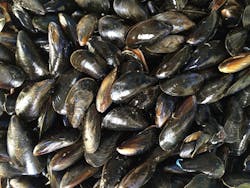Puget Sound Mussels Absorb Traces of Opioids From Storm Water Runoff
Scientists from the Washington Department of Fish and Wildlife (WDFW) discovered traces of oxycodone in the tissues of native bay mussels in Puget Sound, Wash. This is this first time that opioids have been discovered in local shellfish, according to the Puget Sound Institute. Additionally, scientists found high levels of the chemotherapy drug melphalan, raising concerns of the biological impacts on Puget Sound species.
The mussels were part of the state’s Puget Sound Mussel Monitoring Program where WDFW scientists transplant uncontaminated mussels from an aquaculture source on nearby Whidbey Island throughout Puget Sound in order to study pollution levels. The mussels are gathered every two to three months to study pollution levels in their tissues.
Reportedly, the oxycodone-tainted mussels were pulled from a highly urbanized area and not near any commercial shellfish beds. Scientists predict the opioids entered the waterway through wastewater discharges or storm water runoff. While the oxycodone was not at dangerous levels, scientists worry about the biological effect on fish in relation to several studies which show zebrafish learn to dose themselves with opioids when exposed. The melphalan was found at comparable levels to human dosage and can potentially compromise DNA function in local fish.
Moving forward, the WDFW team will use high-resolution mass spectrometry to look for additional chemical exposures and best monitor biological impacts.
